|
|
|
|
I have a new name.
My sons have, on occasion, begun referring to me as Mamãe. My six-year old came into the house looking for me the other day. From upstairs, I heard him ask Dete, our nanny, Cadé Mamãe?
It was a strange, almost out-of-body experience. I looked around for a moment myself, wondering where this Mamãe person was.
Are we different people when we speak in different languages?
In some subtle ways, I think so, and I think my sons are beginning to understand this: that another language can be a mask, allowing them to express another aspect of themselves...
Read more...
|
|
|
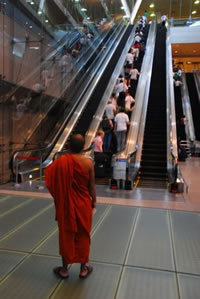
|
...On my first day of school, 1,200 students, ordered by class in groups of 40, clad in gray shirts, shorts, and skirts, sat on the volleyball and basketball courts in front of the school. The bell rang, and they all stood up, some still chatting, some fidgeting and shifting, others rushing through the crowd to get to their assigned spaces. The second bell rang and everyone stood still and quiet. They sang the national anthem and the school song, then sat back down. After welcoming the students to the new year and making a few announcements, the principal introduced the new teachers for the year. As I took my place in line behind the new local teachers, I heard waves of giggling and mumbling rippling across the crowd. When the principal announced my name and I walked across the stage, the students burst into applause punctuated by hoots and screams. For nearly all, I was the first foreign teacher they had ever had. And for most, even in Southeast Asia's most cosmopolitan city, I was the first foreigner they had ever met...
Read more...
|
|
|
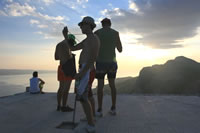
|
...Tour guiding requires a lot of energy, people skills, and patience, but it is also very fulfilling when you are appreciated. It is a way to see a country's highlights and make some money while doing so. My employment as a guide was only a small percentage of what Croatia has to offer in regards to tourism and work options. An Internet search for Croatia will bring up endless travel and tour sites, whether one is looking for a deluxe luxury yacht with a crew of seven to sail the islands, an opportunity to pick olives with the locals, donkey tours or diving, there is a tour for everyone, and possible job opportunities with these companies. Many companies appreciate people who can speak English, German, and Italian...
Read more...
|
|
|
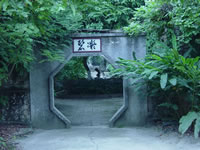
|
I took a 2-month internship with Professor Yi as the concluding semester and thrilling climax of my Bachelor of Health Science. This involved studying for four years at college in Australia, memorizing hundreds of acupuncture points, point prescriptions, Traditional and Western diagnoses, anatomy, physiology, biochemistry, individual Chinese herbs and complicated formulae. Traditional Chinese Medicine originated around two thousand years ago and is loosely based around the theory of yin and yang...
Read more...
|
|
|

|
...There are many things about Istanbul that continue to surprise me with their beauty, constantly affirming my decision to come and teach here for a year or two. What had attracted me in the beginning was the lure of the exotic, differences of culture, language, and religion. But I was also to find much that was familiar, and it is this mixture that defines Istanbul. For Istanbul is indeed a city of two halves, and not just in the geographical sense. In fact, there is no neat separation of the "two cities," rather they are mixed up in one joyful boiling pot. Contrasts are everywhere...
Read more...
|
|
|
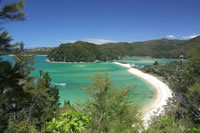
|
...Our plan for the year was simple. We were approximately 10 years older than most working holidaymakers, and had spent our twenties in busy, stressful city jobs. This was not something we were doing to further our careers, but a chance to rediscover who we were and what our priorities were in life. We wanted to immerse ourselves in the varied and awe-inspiring landscape of New Zealand, explore the weird and wonderful wildlife, and really get to know the country and its people...
Read more...
|
|
|
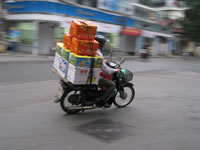
|
...In Hanoi, reality and romance are woven together unapologetically. When the traffic relaxes, it is impossible not to sing, at least in your head. These are the times when being in a place so far from your own home is a thing of immense excitement and beauty. When the delivery boy stares at me, I wave at him. If I hurry a little, I get to school in time to enjoy a hurried iced coffee, while I hunch over miniature plastic chairs, sharing lesson plans. Often though, my mood depends on traffic. There have been times when I have arrived hollow and dry, grimy and coughing, struggling to shake of the Hanoi rush hour. The sound made by 1,000 impatient motorbikes can be likened to an enormous waterfall. The traffic itself is not unlike a river, gathering momentum in little streets, picking up stray pieces along the way until it is a monstrous torrent, which does not stop to consider anything. I have seen riders go down, swallowed up, only to emerge shaken from the fray, minutes later...
Read more...
|
|
|

|
...When I first moved to this region, I presumed stranger was used solely for foreigners-strangers. But then a French friend who moved here years ago explained that nobody is considered a local here until the third generation of the family had been buried. I am united with other French people as an outsider and that is strangely comforting, for as homely as these mountains feel, the locals really do live a world away from the rest of us, benefiting from privileges they only ever reward each other with while the rest of us wait in line for bread. Some here called this world the La Clusaz mafia, but it is as transparent to me as I am to it. We share the same mountains but not the same social circle...
Read more...
|
|
|
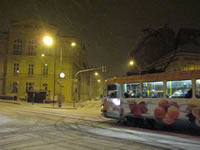
|
...A friend of mine called Prague a Milan Kundera pop-up book, with its gorgeous architecture, and the sense of enchantment that hangs over the city. Many a writer has found an unending source of inspiration here, and I am certainly one of them. Kafka wrote that Prague is like a little old lady with claws who grabs you and never lets you go, and I feel very much in her grasp. Every time I've fancied the thought of leaving here something extraordinary happens that forces me to reconsider. Like anywhere foreign, it can be very trying-even alienating-but there is so much beauty and wonder in Prague. Certainly enough to keep a person fascinated for the rest of their life...
Read more...
|
|
|

|
...In the months that followed, our entire family was invited to celebrate many a child's birthday. We were surprised by the lavish preparations parents dedicated to these affairs for their 5-year-olds. Buffet tables were heaped high with carne asada and freshly caught snapper, barbecued in a bright orange, Mayan, tic-n-xic style. Parents danced — to the embarrassment of some of the young children — to the brazen, jaunty melodies of the hired mariachi band. Parents held down the tablecloths in the breezes that swept the palm trees and the powdery white sand at a beach party. The parties lasted hours, as guests dined, played, drank, and often languished long past midnight. This was a far cry from our previous Seattle party invitations, with the typical 2-hour time frame accompanied by strict instructions for parents to drop-off and pick up their kids on time. ...
Read more...
|
|
|
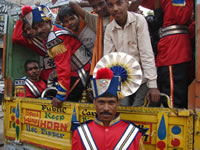
|
...The memories that resonate most about living in Delhi relate to being on a busy street. School children pass by children of the same age who work as “ragpickers” — the descriptive term for people who collect bottles and paper for a pittance. Monkeys steal fruit out of the hands of unwary pedestrians and temple elephants walk down to the river to be washed. Cows wander, sniffing out snacks that they receive from piles of waste or benevolent street sellers. Army cadets march past MBA students leaning on their motorbikes, both reaching into their pockets to give change to an impoverished old lady.
When you step onto the street, you step into Indian culture. Street sellers and school children would ask friendly questions about our origins and our favorite cricketer. When lost, crowds would gather to help us find our way. As directions could not always be trusted — Indians find it hard to admit that they do not know an answer, preferring instead to gesture vaguely in an uncertain direction — crowd gatherings could happen several times in an afternoon. The advantage to staying far from tourist haunts is that hawkers and scam artists did not operate at our local hang outs, and people were curious and happy to interact with us. Hours could be spent wandering the backstreets, drinking with chai wallahs and learning about the diversity of life in Delhi...
Read more...
|
|
|
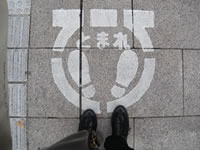
|
...When my husband scheduled a weeklong business trip to the Tokyo area, I leapt at the chance to go along and make use of his paid-for hotel room. I had concerns though: Would I be able to find my way around, not speaking or reading Japanese? I wondered how much English signage there would be in the excellent train and subway systems. And I wondered what would happen when I got out of a station and onto a street? I have a poor sense of direction and can easily get turned around even with a map. Would I feel welcome, a 6-foot, red-haired, middle-aged Western woman on her own in Tokyo? I’ve been traveling or living in foreign countries since I was four years old, and I have experienced the spectrum of reactions: from curiosity to hostility, from aggressiveness to kindness, from disdain to welcome. What would I find in the Japan of 2010?...
Read more...
|
|
|
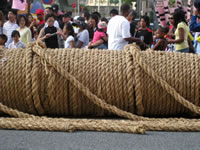
|
...Okinawa is a unique place in the world to witness the dynamic interplay of both Eastern and Western culture. The U.S. has maintained a presence on the island since the end of World War II, and as many as 50,000 Americans reside here at any one time.
One might assume that vast American presence “waters down” the foreignness of the island. On the contrary, it stimulates a unique hybrid way of life. Hundreds of children born here grow up bilingual, practice traditions from two distinct cultures, and develop an awareness of diversity from a young age...
Read more...
|
|
|
|
|
|
I understand the dilemma of the first time international job seeker: You can't get a job overseas unless you have experience. But how do you get experience if you can't get a job? In this article, I'll share five proven strategies to break out of this Catch-22. Plus I'll suggest some additional creative options to explore to get yourself overseas without breaking your piggy bank... Read more...
|
|
Ask the Expat Q&A
The Wired Expat
by a Living Abroad Contributing Editor Volker Poelzl
|
|
|
|
Being connected to the Web and having high-speed and instant access to the Internet, data and information has become a way of life for millions of people around the world. The number of people accessing the mobile internet is growing at an enormous rate. In 2009 there were an estimated 450 million mobile internet users worldwide, and this figure is expected to double in the next few years. The ITU (International Telecommunication Union, a United Nations agency) estimates that mobile Web access with laptops and smartphones will overtake desktop web access within five years...
Read more...
|
|
|
|
|
|
Managing communication tools like phone, mail, and Internet is usually quite easy in the comfort of home. But it's a different story when you travel long-term or full-time. How do you know when you received mail from the tax-man? Where will your next Internet connection come from? And what is the most cost-effective way to make and receive phone calls? If you work while traveling, having these communication essentials figured out becomes even more important. In this article, we will explore how to manage life and work on the road easily and inexpensively...
Read more...
|
|
|
|
|
|
Preparing for travel abroad can be a daunting task, especially when it comes to putting your affairs in order. There are official documents to gather, phone numbers to collect, and emergencies to hedge against. Then you have to find a way to organize and carry (and not lose) some of these documents, which is a challenge unto itself on the road. This article will help you prepare for your own trip abroad, providing you with guidelines regarding what to consider and how to pull it all together...
Read more...
|
|
|
|
|
|
|
"Good to see you, Beth. You've gained weight!" These were the words of greeting from my tour guide, Tshering, in Bhutan, whom I hadn't seen in four months. The two pounds I had gained since my last visit was likely due to the previous three weeks of buffets while I was touring through Vietnam and Cambodia...
Read more...
|
|
|
|
|
|
Now, after three years of traveling and working tirelessly on his blog, Everything-Everywhere.com, Gary Arndt has become one of the most-recognized travel bloggers in the world. Matt Gibson caught up with Gary in Thailand via email to uncover some of the secrets of his blogging success...
Read more...
|
|
|
|
|
|
Here in the UK we are lucky enough to have a huge network of historic canals and beautiful rivers winding their way through some of our most treasured countryside and vibrant cities. I can tell you from experience that there is a pronounced difference between taking the highroad, and taking the towpath. Whereas on the busy streets people shuffle by with not so much as a hurried nod, down below lies a whole new world. A world where people readily pass the time of day, observe wildlife — and life — in greater detail, and where I can guarantee that you, as a visitor, will enjoy a truly unique and different experience of this wonderful country...
Read more...
|
|
|
|
|
|
You have made the first step: you decided to study abroad. As a conscientious student, you are now approaching the study abroad office for your first appointment. While an agenda of items to be considered will naturally differ for every student, there is one question that will come up for all: how long do you want to study abroad?
Read more...
|
|
|
|
TAzine is a monthly Webzine which continues in the 33-year tradition started by Transitions Abroad magazine in a new medium. TAzine features many of the same columnists
who wrote for the magazine, a growing group of new columnists, while featuring many freelance writers who wish to share their experiences and expertise within the context of our innovative alternative coverage of work, study, travel, and living abroad.
Founded in 1977 by Dr. Clayton Allen Hubbs, Transitions Abroad magazine was the only print publication dedicated to work, study, living, volunteering, and immersion
travel abroad. Its purpose — in print and now as a Webzine — is the dissemination of practical information leading to a greater understanding of other cultures through direct participation in the daily life of the host community.
|
Current Issue and Focus
Living and Working Abroad. Expatriate Writing Contest Winners.
|
Previous Issue and Focus
Study Abroad, Student Writing Contest Winners, and Educational Travel
|
|
|
|
|
To view all TAzine back issues, see our archive.
|
|
|
|
